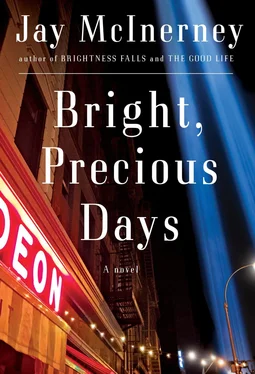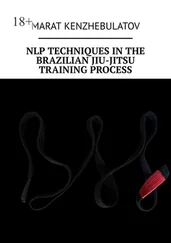After he dismissed the driver, they walked over to Canal Street and descended into the IRT, squeezing themselves into the crowded number 2 train among the rush-hour commuters. She was pressed against his shoulder and thigh, her legs enveloping his, and even in the stale, funky train car he could smell her hair. He’d almost forgotten that smell. Absurdly, he found himself getting hard. They rode most of the way in silence, leaning together, their physical contact obviating the need for speech. Whatever they needed to tell each other was too intimate to be said here.
They got off at Grand Concourse/149th Street, Corrine leading the way up a series of passages and stairways to the corner of two large boulevards, where she indicated their direction with a nod of her head.
“So tell me,” she said, “did you just forget to tell your wife about me, or did you deliberately not tell her about me?”
“I think the latter.”
“And will you be telling her about me now?”
“No, I definitely don’t think so.”
“Why not?”
He tried to decide why, and then whether, to tell Corrine the truth. “Because if I really told her how I felt about you, it would break her heart.”
She seemed genuinely surprised by this declaration. After digesting it, she said, “Is she enjoying New York?”
“Actually, she left this morning.”
They passed a barbershop with matching lurid-colored hagiographic posters of John F. Kennedy and Martin Luther King, Jr., crossed the boulevard and turned into a smaller street lined with low-rise hair salons, bodegas, clothing boutiques, liquor stores and an abandoned brownstone covered in graffiti, including the slogan ARM THE HOMELESS.
Corrine pointed to a cluster of brick towers in the distance. “That’s our objective. Four thousand residents in the poorest congressional district in America. The nearest supermarket is more than a mile away. And of course no one has a car. A gypsy cab to the supermarket will cost eight, ten bucks each way. Most of them buy their food from the bodegas, which stock no fruit or vegetables aside from a few old plantains.”
As they approached the towers, a long queue of people stretched back along the sidewalk.
“Our clients,” Corrine said. “Looks like a busy day.”
As they walked down the line, a motley, colorful cohort attired not only in the baggy staples of American leisure wear but also in the traditional garb of at least half a dozen nations, she greeted several of them by name.
“How’s your gout, Jimmy? Are you staying away from the red meat?”
“Tolerable better, though I did get me a batch of ribs night ’fore last.”
To another man she said, “How’d that job interview work out?”
“Would I be in this fuckin’ line if it did?”
Luke wanted to tell the guy to show a little respect, but Corrine pushed on, saying, “Come talk to me inside.”
Luke followed her, hopping over a chain into a parking lot flanked on either side by open tents. Corrine introduced him to several harried colleagues and deposited him with a group of volunteers. “Georgia here will show you the ropes.” Georgia was a petite Goth brunette whose grooming and wardrobe choices seemed to intentionally contradict her sylphlike physique: her hair cropped close to her skull, her ears studded with metal, her pale skin, where it emerged from her black leather jacket, heavily embroidered with tattoos.
“We’re cucumbers,” she said.
“Pardon?”
“Our station. We’re distributing cucumbers.”
“Okay.”
“You always dress like that to hand out vegetables in the South Bronx?”
“When I got dressed this morning, I didn’t know I’d be coming here.”
“What, you thought you were going to shoot an ad for GQ ?”
“I’ll pretend that was intended as a compliment.”
“Whatever gets you off, dude. Nice scar, though.”
She showed him the stacked cartons filled with cucumbers, how to weigh and bag them in three-, four- and six-pound units. “The clients have a coded checklist, A ’s the smallest bag, C the biggest. I’m hoping you can guess which one B is. When you give them their bag, you check it off their list so they don’t try to come back again.”
When the gate opened a few minutes later, they were besieged by a procession of supplicants, their demeanors as various as their sizes and shapes, showing degrees of gratitude from shy to effusive; some resentful and sullen, others embarrassed, a few greedy, trying to snatch up extra bags or pass through the line twice. The majority were women, the men mostly elderly, a few sulking teens among them. After an hour he was told to take a break, at which point he called his driver. When he returned to his station, one of his coworkers informed him that many of the cucumbers in the second pallet were rotten; they ended up throwing half of them out.
Corrine appeared to assess the situation. “I can’t believe they pawned this shit off on us,” she said. As it turned out, they were running short on the other vegetables, too, with some forty or fifty people still waiting in line, so she instructed the volunteers to cut the rations in half. With the crisis more or less in hand, she told Luke she had to get back to her office.
Hoping to persuade her otherwise, he followed past the stragglers and out into the street. For some reason, she felt particularly bad about the very last woman in line, a strung out — looking mom with matted hair and two shivering toddlers, one of whom wore mismatched boots. Corrine tried to slip her ten dollars, but instead of quietly pocketing the bill, she snapped, “What the fuck this for?” holding it out in front of her, pinched between her thumb and forefinger, as if it were tainted.
“I just felt bad that we’d run low on provisions.”
“I don’t need your fuckin’ pity,” the woman shouted.
Corrine looked stunned by her wrath. “I just thought, with your two little ones—”
“Don’t you be talking ’bout my kids. Ain’t none ayo’ fuckin’ bidness.”
The next woman in line said, “Hey, sister, you don’t want it, I’ll be happy to help out.”
“Who asked you to put your fuckin’ nose in it?” After the recipient of the bill crumpled it in her fist and pocketed it, word of the cash handout spread down the line, provoking queries from those who’d received only coupons.
A skeletal man stood with his hand outstretched before her, wrapped in one of those quilted blue blankets used by moving companies to cushion furniture in transit.
Corrine was clearly mortified, all the more so when Georgia came over and said, “What’s going on?”
“What’s goin’ on is — some people gettin’ special treatment.”
Corrine drew her colleague away and tried to explain the situation. “I know, I know,” she said in response to the reprimand that Georgia had yet to deliver. “Totally unprofessional.”
“Well, you’re the boss,” Georgia said in a tone of voice that transparently betrayed her actual belief — that Corrine was a slumming dilettante.
“Well, that was incredibly embarrassing,” Corrine said when they were alone. “I’m sorry you had to see that.”
“Don’t be. I love it that you have such a big heart. So, might you consider accepting a ride downtown?” he asked, spotting his car idling across the street.
She seemed deflated by the recent fracas, less trusting of her instincts. “Just give me a ride to the subway.”
“Let me buy you lunch,” he said when the driver asked for their destination.
“I need to get back to the office.”
“Just a quick bite at the Four Seasons — it’s on the way,” he said after she’d given the address. “I’ve hardly spoken to you the last three hours.”
Читать дальше












